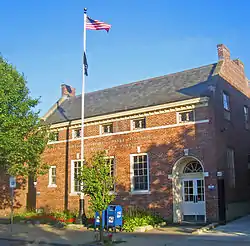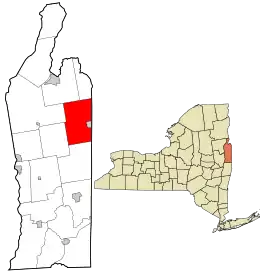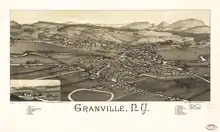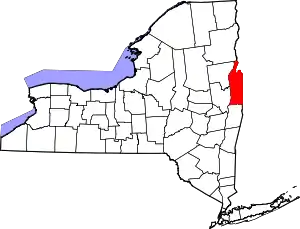Granville, New York
Granville, New York is a town on the eastern border of Washington County, abutting Rutland County, Vermont. It is part of the Glens Falls Metropolitan Statistical Area.[5] The town population was 6,456 at the 2000 census.[2]
Granville | |
|---|---|
 Granville Post Office | |
 Location in Washington County and the state of New York. | |
| Coordinates: 43°25′20″N 73°18′20″W | |
| Country | United States |
| State | New York |
| County | Washington |
| Government | |
| • Mayor | Paul Labas |
| Area | |
| • Total | 56.12 sq mi (145.35 km2) |
| • Land | 55.62 sq mi (144.05 km2) |
| • Water | 0.50 sq mi (1.30 km2) |
| Elevation | 653 ft (199 m) |
| Population | |
| • Total | 6,669 |
| • Estimate (2016)[3] | 6,504 |
| • Density | 116.94/sq mi (45.15/km2) |
| Time zone | UTC-5 (Eastern (EST)) |
| • Summer (DST) | UTC-4 (EDT) |
| ZIP codes[4] | 12832 (primary)
|
| Area code(s) | 518 |
| FIPS code | 36-30037 |
| GNIS feature ID | 0979014 |
The town of Granville contains a village that also bears the name Granville. Granville is named for John Carteret, 2nd Earl Granville.[6]
Granville has been called the "Colored Slate Capital of the World." Quarries in the town mine slate that comes in colors such as green, gray, gray black, purple, mottled green and purple, and red.[7] Walter Granville-Smith was born in Granville.
Granville Avenue and the associated CTA station in Chicago are named after the town,[8] as was the former Town of Granville, Wisconsin.
History
From evidence discovered around 1850, the St. Francis Native Americans appear to have used the town for hunting and making tools in the past.

This border area between Vermont and New York was for a long time not clearly under control of either state. Arrivals from New England settled here hoping to gain the benefits of New England in areas such as land ownership and voting rights. Early settlers arrived before 1770, but the state line was not established until 1790, leaving settlers in this town within New York State.
The town was founded in 1780.
Early agricultural efforts included dairy herds and sheep raising.
Extensive slate deposits were located in 1846 in nearby Fair Haven, and in 1850 more slate deposits were found in Middle Granville. The first Granville slate quarries opened around 1853. The first slate deposits had been located in 1839 and were used for local construction.
Geography
The east town line is the border of Vermont (Rutland County).
According to the United States Census Bureau, the town has a total area of 56.1 square miles (145.4 km2), of which, 56.1 square miles (145.2 km2) of it is land and 0.04 square miles (0.1 km2) of it (0.05%) is water.
NY 22A diverges from NY 22 by Middle Granville. NY 149 joins NY 22 south of Granville village.
The Mettawee River and the Indian River are two large streams in the town.
Neighboring cities and towns
Demographics
| Historical population | |||
|---|---|---|---|
| Census | Pop. | %± | |
| 1820 | 3,727 | — | |
| 1830 | 3,882 | 4.2% | |
| 1840 | 3,846 | −0.9% | |
| 1850 | 3,434 | −10.7% | |
| 1860 | 3,474 | 1.2% | |
| 1870 | 4,063 | 17.0% | |
| 1880 | 4,149 | 2.1% | |
| 1890 | 4,716 | 13.7% | |
| 1900 | 5,217 | 10.6% | |
| 1910 | 6,434 | 23.3% | |
| 1920 | 4,966 | −22.8% | |
| 1930 | 5,806 | 16.9% | |
| 1940 | 5,508 | −5.1% | |
| 1950 | 5,116 | −7.1% | |
| 1960 | 5,015 | −2.0% | |
| 1970 | 5,412 | 7.9% | |
| 1980 | 5,566 | 2.8% | |
| 1990 | 5,935 | 6.6% | |
| 2000 | 6,456 | 8.8% | |
| 2010 | 6,669 | 3.3% | |
| 2016 (est.) | 6,504 | [3] | −2.5% |
| U.S. Decennial Census[9] | |||
As of the census of 2000, there were 6,456 people, 2,411 households, and 1,668 families residing in the town. The population density was 115.1 people per square mile (44.4/km2). There were 2,635 housing units at an average density of 47.0 per square mile (18.1/km2). The racial makeup of the town was 98.08% White, 0.37% Black or African American, 0.22% Native American, 0.28% Asian, 0.02% Pacific Islander, 0.20% from other races, and 0.84% from two or more races. Hispanic or Latino of any race were 0.62% of the population.[2]
There were 2,411 households, out of which 34.1% had children under the age of 18 living with them, 54.2% were married couples living together, 10.2% had a female householder with no husband present, and 30.8% were non-families. 25.6% of all households were made up of individuals, and 12.1% had someone living alone who was 65 years of age or older. The average household size was 2.56 and the average family size was 3.06.[2]
In the town, the population was spread out, with 26.4% under the age of 18, 7.0% from 18 to 24, 26.5% from 25 to 44, 23.2% from 45 to 64, and 16.8% who were 65 years of age or older. The median age was 38 years. For every 100 females, there were 95.5 males. For every 100 females age 18 and over, there were 90.0 males.[2]
The median income for a household in the town was $36,128, and the median income for a family was $39,486. Males had a median income of $30,177 versus $20,128 for females. The per capita income for the town was $16,335. About 8.3% of families and 11.5% of the population were below the poverty line, including 12.3% of those under age 18 and 13.4% of those age 65 or over.[2]
Communities and locations
- Granville – A village located on NY 149 by the Vermont border.
- Granville Airport (B01) – Located one mile north of Granville village. One asphalt runway.
- Guilder Hollow—The now-extinct hamlet was named for the van Guilder family that resided there. A. H. Estabrook and Charles Davenport's "The Nam Family: A Cacogenic Family of New York State" (1912) provides a pseudo-scientific ethnography of the family. The study gave pseudo-scientific support for eugenics, which linked feeblemindedness, criminality and a host of other failings to genetics, and proposed to improve society by limiting the reproductive rights of "defective" families.
- Hillsdale – A hamlet in the south part of the town on NY 149.
- Martins Pond – The largest of several ponds located south of Slyboro.
- Middle Granville – A hamlet northeast of Granville village, located on NY 22A. The Dayton-Williams House was listed on the National Register of Historic Places in 2006.[10]
- North Granville – A hamlet on NY 22 in the northwest part of Granville. The Town-Hollister Farm was listed on the National Register of Historic Places in 2008.[10]
- Raceville – A hamlet in the northeast part of the town, located on NY 22A.
- Slyboro – A hamlet west of the Granville village, located on County Route 23.
- South Granville – A hamlet on NY 149 in the southeast part of the town. The South Granville Congregational Church was listed on the National Register of Historic Places in 2005. The Lemuel Haynes House is listed as a National Historic Landmark.[10]
- Truthville – A hamlet just east of North Granville.
- West Granville – A hamlet on NY 40 at County Route 17 by the west town line.
- West Pawlet – A community on the border of Vermont in the southeast corner of Granville at the end of County Route 29.
Education
- Mary J. Tanner School – Educates Kindergarten through 3rd grade level students.
- Granville Elementary School – Educates 4th through 6th grade level students.
- Granville High School – Educates students in 7th through 12th grade, including high school students.
References
- "2016 U.S. Gazetteer Files". United States Census Bureau. Retrieved Jul 5, 2017.
- "U.S. Census website". United States Census Bureau. Retrieved 2008-01-31.
- "Population and Housing Unit Estimates". Retrieved June 9, 2017.
- Washington County GIS Web Map (Map). Washington County, NY. Archived from the original on 2010-01-07. Retrieved 2010-06-18.
- "Metropolitan Areas and Components, 1999, with FIPS Codes". US Census Bureau. Retrieved July 7, 2009.
- Gannett, Henry (1905). The Origin of Certain Place Names in the United States. Govt. Print. Off. pp. 142.
- "Granville, NY". Village of Granville. Retrieved 2009-05-20.
- "Chicago Streets" (PDF). Retrieved 2011-02-03.
- "Census of Population and Housing". Census.gov. Retrieved June 4, 2015.
- "National Register Information System". National Register of Historic Places. National Park Service. March 13, 2009.
External links
| Wikimedia Commons has media related to Granville, New York. |
